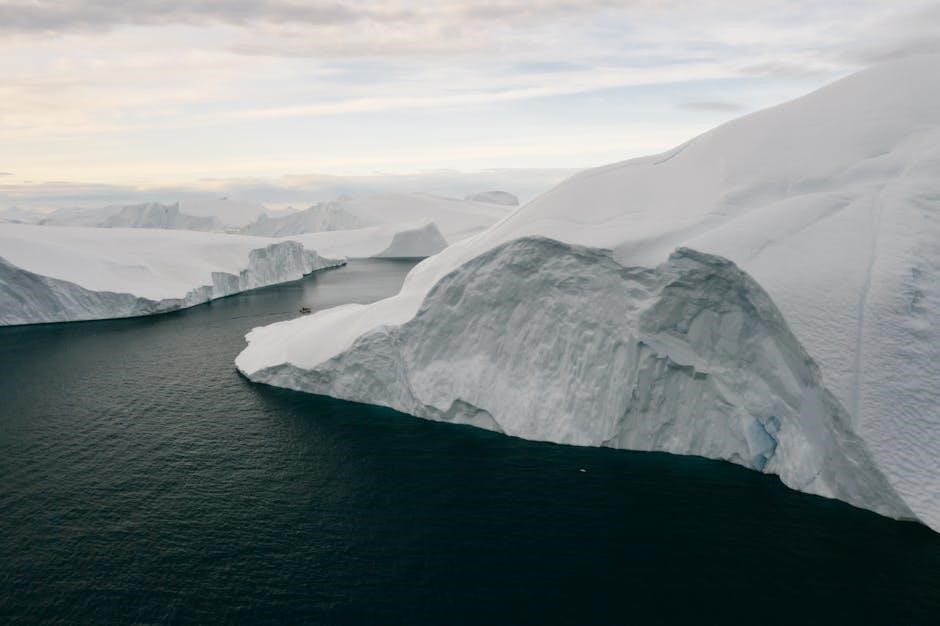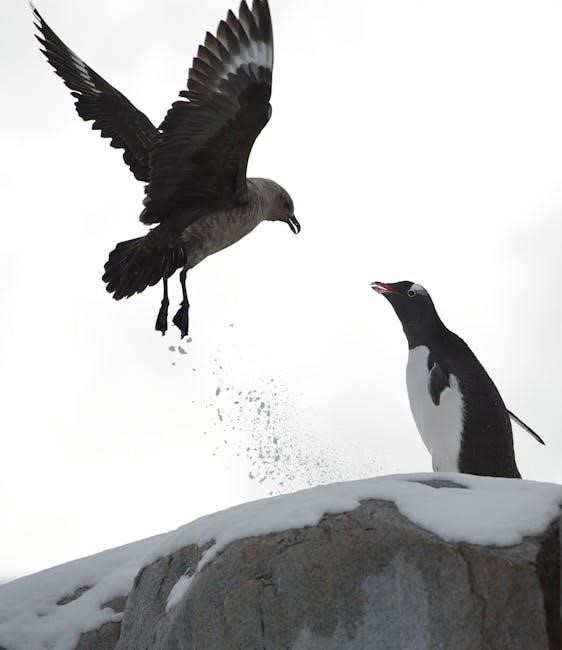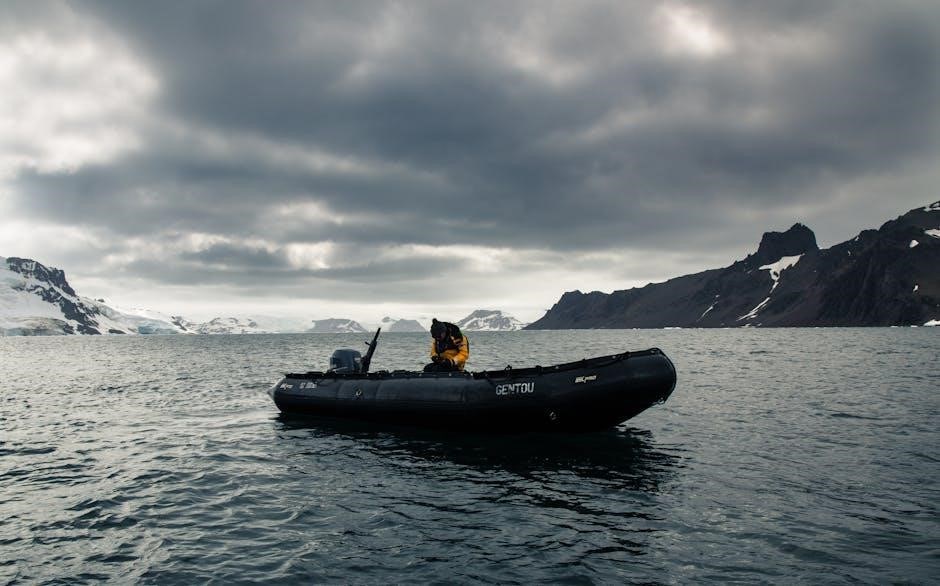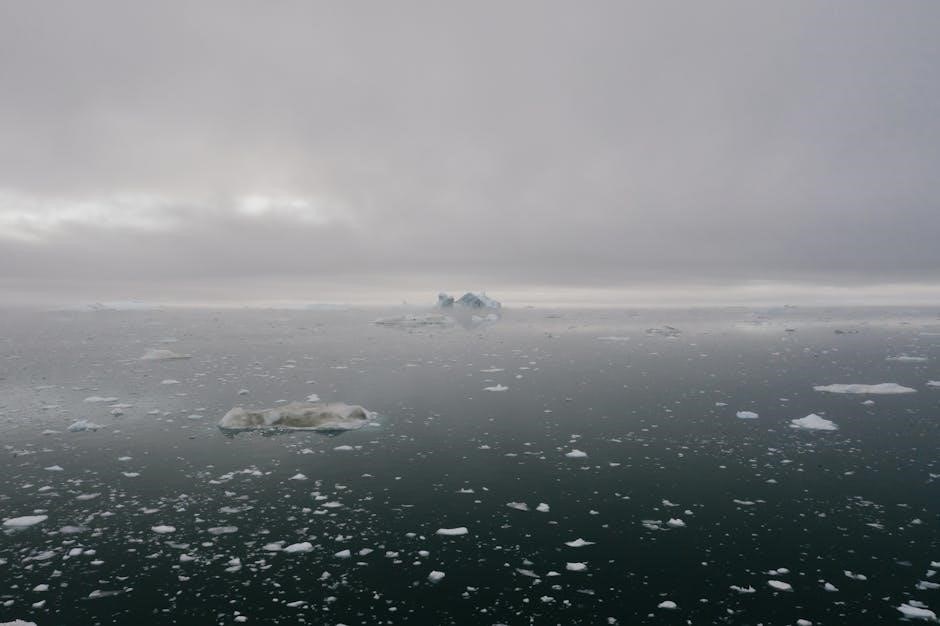“Out of Antarctica PDF” by Robert Argod examines humanity’s origins, connecting myths with Antarctic discoveries, offering fresh insights into Earth’s history and human evolution.

Overview of the Topic
The topic “Out of Antarctica PDF” delves into the exploration of Antarctica’s role in shaping human history and the origins of civilizations. It combines scientific research with mythological insights, offering a unique perspective on Earth’s history. The continent’s isolation and extreme climate make it a focal point for studying climate change and subglacial discoveries. Recent studies highlight narrow and deep bedrock depressions revealed by the BEDMACHINE model, while historical expeditions, such as those led by Robert Argod, explore the continent’s hidden threats and its significance in global science.
Importance of Antarctica in Global Research
Antarctica serves as a unique and critical location for global scientific research. Its pristine environment and extreme climate provide unparalleled opportunities to study climate change, subglacial ecosystems, and Earth’s geological history. The continent’s ice sheets hold vital climate records, while its isolation makes it ideal for conducting meteorological and glaciological surveys. International cooperation in Antarctic research has led to significant discoveries, such as subglacial bedrock depressions revealed by the BEDMACHINE model, enhancing our understanding of Earth’s systems and informing global environmental policies.

Structure of the Article Plan
This article explores the significance of Antarctica through multiple lenses. It begins with an introduction to the book “Out of Antarctica PDF” and its themes on human origins. The structure then delves into historical expeditions, highlighting early explorers and Russia’s role in Antarctic exploration. Scientific research is covered next, focusing on subglacial discoveries and climate studies. The book’s reception and modern logistical challenges are also discussed. Finally, the article examines cultural and economic aspects, concluding with future implications of Antarctic research for global science.

Historical Expeditions to Antarctica
Early explorers like Robert Falcon Scott and Ernest Shackleton led pivotal expeditions, while Russia’s Antarctic voyages, such as those by Fabian von Bellingshausen, marked significant milestones in discovery.
Early Explorers and Their Contributions
Early explorers, including Robert Falcon Scott and Ernest Shackleton, played crucial roles in mapping Antarctica’s terrain and conducting scientific research. Their expeditions revealed vital data on the continent’s geology, climate, and wildlife. Shackleton’s perseverance during the Endurance expedition demonstrated remarkable human resilience. These pioneers laid the foundation for modern Antarctic research, inspiring future scientists to explore this unforgiving yet fascinating land. Their contributions remain integral to understanding Earth’s most remote region.
The Role of Russia in Antarctic Exploration
Russia has significantly contributed to Antarctic exploration since the early 19th century. The expeditions led by Fabian von Bellingshausen in 1819-1821 were pivotal, as they were among the first to sight the Antarctic continent. Today, Russia operates several research stations, conducting vital scientific studies on climate change, glaciology, and subglacial discoveries. Their work enhances global understanding of Antarctica’s role in Earth’s ecosystem, emphasizing international collaboration in polar research, as highlighted in “Out of Antarctica PDF.”
Key Discoveries from Past Expeditions
Past Antarctic expeditions have uncovered groundbreaking insights, including subglacial lakes and deep bedrock depressions revealed by the BEDMACHINE model. These discoveries highlight the continent’s geological complexity and its role in global climate dynamics. Historic research, such as meteorological surveys and glaciological studies, has provided critical data on ice sheet dynamics and surface melting patterns. These findings, as discussed in “Out of Antarctica PDF,” significantly enhance our understanding of Earth’s history and humanity’s potential connections to this enigmatic continent.
Scientific Research in Antarctica
Scientific research in Antarctica focuses on subglacial discoveries, climate change, and meteorological studies. These investigations, as detailed in “Out of Antarctica PDF,” reveal the continent’s hidden geological and climatic secrets, offering insights into Earth’s history and humanity’s connection to this frozen landscape.
Subglacial Discoveries and Their Significance
Recent subglacial discoveries in Antarctica, highlighted in “Out of Antarctica PDF,” reveal vast, narrow bedrock depressions shaping ice dynamics. These findings, supported by advanced glaciological surveys, provide critical insights into ice sheet stability and climate change impacts. Such research underscores the continent’s role in global environmental systems, linking its hidden geological features to humanity’s evolutionary journey and Earth’s history, as explored in the book. These studies are pivotal for understanding future climatic shifts and their far-reaching consequences.

Climate Change Studies and Ice Sheet Dynamics
Antarctica’s ice sheets are central to global climate change studies, as highlighted in “Out of Antarctica PDF.” Research reveals that surface melting, rather than basal sliding, drives ice loss, contrasting with Arctic sea ice trends. Ice cores provide ancient climate records, while glaciological surveys track dynamic ice movements. These studies, supported by advanced models, are crucial for understanding ice sheet stability and its impact on global sea levels. Such findings link Antarctic dynamics to broader climate patterns, offering insights into Earth’s past and future environmental shifts, as explored in the book.

Meteorological and Glaciological Surveys
Meteorological and glaciological surveys in Antarctica are vital for understanding climate dynamics. Ground-based glaciological surveys on George Island and elsewhere track ice sheet behavior, revealing surface melting as a primary driver of ice loss. Ice cores from central Antarctica provide detailed climate records, while meteorological studies focus on wind patterns and their southern hemisphere impact. These surveys, often conducted by international teams, are essential for modeling global climate changes and predicting sea-level rise, as discussed in “Out of Antarctica PDF.”
The Book “Out of Antarctica”
“Out of Antarctica” by Robert Argod delves into humanity’s origins, blending myths and maritime expertise. Available in PDF, it explores Antarctic discoveries and their global impact.
Author Background and Expertise
Robert Argod, a master mariner and researcher, combines his maritime expertise with a deep interest in myths and legends. His work, “Out of Antarctica”, reflects his unique blend of skills, offering a fresh perspective on human origins. Argod’s research delves into Antarctic discoveries, linking them to global historical narratives. His background in navigation and exploration provides a credible foundation for his theories. The book showcases his ability to merge scientific inquiry with storytelling, making complex ideas accessible to a broad audience.
Themes and Reflections on Human Origins
“Out of Antarctica” explores themes of human origins, linking ancient myths with Antarctic discoveries. Argod reflects on how the continent’s hidden history might reshape our understanding of civilization. The book delves into the idea that Antarctica could be the cradle of humanity, challenging conventional theories. By connecting scientific findings with historical narratives, Argod offers a compelling perspective on how our ancestors might have migrated and evolved. This interdisciplinary approach bridges paleontology, genetics, and mythology, providing a fresh lens to view human history.
Reception and Reviews of the Book
“Out of Antarctica” has garnered significant attention for its unique blend of scientific research and mythological insights. Readers praise its thought-provoking narrative, which challenges conventional theories on human origins. The book’s availability in formats like PDF and Audiobook has broadened its accessibility. Critics highlight Argod’s masterful storytelling and his ability to connect Antarctic discoveries with global myths. While some debate the book’s claims, it remains a compelling read for those interested in alternative perspectives on human history and the mysteries of Antarctica.

Modern Expeditions and Logistics
Modern Antarctic expeditions focus on scientific research and exploration, overcoming extreme weather and logistical challenges with advanced technology and international collaboration, ensuring safer and more efficient operations.
Challenges of Conducting Research in Antarctica
Conducting research in Antarctica presents extreme challenges due to its harsh climate, isolation, and logistical complexities. Researchers face temperatures as low as -93.2°C, frequent blizzards, and limited accessibility. Supply lines are vulnerable, and maintaining equipment functionality in such conditions is difficult. Psychological challenges, including confinement and isolation, affect team morale. Despite these obstacles, scientists persevere, relying on advanced technology and meticulous planning to ensure safe and successful operations in one of Earth’s most inhospitable environments.
Role of Scientific Stations and Their Operations
Scientific stations in Antarctica are crucial for conducting research, with nations like Russia operating stations such as Vostok and McMurdo. These bases enable long-term meteorological and glaciological studies, including ice core analysis and seismic soundings. Researchers at these stations collect data on climate change, subglacial lakes, and unique ecosystems. Their operations involve meticulous logistics, including supply delivery and equipment maintenance, ensuring continuous scientific advancements in one of Earth’s most extreme environments, contributing significantly to global scientific understanding and discovery.
Technological Advancements in Exploration
Modern exploration of Antarctica leverages cutting-edge technologies like satellite imagery, autonomous vehicles, and radar systems to map subglacial terrain. Tools such as the BEDMACHINE model reveal hidden bedrock features, while ice-penetrating radar aids in understanding ice sheet dynamics. These advancements enable researchers to conduct detailed subglacial surveys and improve logistical operations, enhancing our understanding of Antarctica’s geology and ecosystems. Such innovations are crucial for overcoming the continent’s extreme conditions and expanding scientific discovery in this vast, unexplored region.

Cultural and Economic Aspects
Antarctica’s cultural significance spans global research collaboration, while its economic impact involves costly expeditions and resource management, shaping humanity’s shared heritage and international investments.
International Cooperation in Antarctic Research
Antarctic research exemplifies global collaboration, with nations like Russia, South Korea, and others conducting joint meteorological and glaciological studies. The Antarctic Treaty fosters international scientific cooperation, ensuring the continent remains a natural reserve for research. Countries share data and resources, advancing understanding of climate change and subglacial ecosystems. This collective effort highlights humanity’s shared interest in preserving and studying Antarctica, despite geopolitical tensions elsewhere. Such cooperation underscores the continent’s role as a unifying force in global scientific endeavors, benefiting humanity collectively.
Economic Implications of Antarctic Studies
Antarctic research carries significant economic implications, from funding global scientific expeditions to advancing technologies with broader applications. Costs of maintaining research stations, logistic operations, and expeditions are substantial, requiring international investment. Discoveries, such as subglacial resources, spark debates on potential economic exploitation, though the Antarctic Treaty restricts mining. Meteorological and glaciological studies inform climate models, aiding global economic planning. While direct economic gains are limited, the continent’s scientific exploration drives innovation and understanding, benefiting humanity economically and environmentally in the long term, balancing research with preservation efforts.
Cultural Significance of Antarctic Exploration
Antarctic exploration holds profound cultural significance, inspiring myths, legends, and scientific curiosity worldwide. Stories of early explorers and their bravery have shaped global narratives, sparking imaginations. The continent’s untouched wilderness symbolizes humanity’s quest for discovery and understanding. Indigenous cultures, though not native to Antarctica, have shared legends that resonate with its mysterious allure. Modern research stations represent international collaboration, embodying shared human goals. Works like Out of Antarctica PDF link these explorations to broader cultural themes, bridging science with storytelling and inspiring future generations to value this unique continent.
Future Implications and Conclusion
Out of Antarctica PDF highlights the continent’s role in shaping future scientific discoveries and global collaboration, inspiring new generations to explore and protect this unique region.
Impact of Antarctic Research on Global Science
Antarctic research has profoundly shaped global science by revealing critical insights into climate change, glaciology, and subglacial ecosystems. Discoveries like bedrock depressions and ice sheet dynamics influence sea-level models, aiding global climate predictions. International collaborations in Antarctica foster scientific advancements, driving innovation in fields like meteorology and geology. These findings contribute to understanding Earth’s history and mitigating environmental challenges, emphasizing Antarctica’s role as a key region for addressing global scientific questions and fostering international cooperation. Its research continues to inspire new technologies and sustainable practices worldwide.
Future Directions in Antarctic Exploration

Future Antarctic exploration will focus on advanced technologies like autonomous vehicles and satellite imaging to study subglacial environments and ice dynamics. International collaborations will expand, emphasizing sustainable research practices and climate change monitoring. New initiatives will target unexplored regions, leveraging innovations in glaciology and meteorology. The integration of artificial intelligence and real-time data systems will enhance logistic operations, enabling safer and more efficient expeditions. These advancements will deepen our understanding of Earth’s history and address pressing global challenges, ensuring Antarctica’s continued role as a frontier for scientific discovery.
Final Thoughts on “Out of Antarctica PDF”
“Out of Antarctica PDF” offers a compelling narrative on human origins and Antarctic discoveries. Robert Argod’s work bridges mythology, science, and history, providing a unique perspective on Earth’s past. The book challenges conventional theories, inspiring further exploration and interdisciplinary research. Its themes resonate with both scientists and enthusiasts, making it a thought-provoking read. By linking Antarctica’s secrets to humanity’s story, Argod underscores the continent’s importance in understanding our planet. This book is a testament to the enduring fascination with Antarctica and its role in shaping global knowledge.
